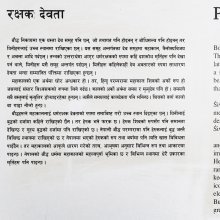Tattva: 36 definitions
Introduction:
Tattva means something in Buddhism, Pali, Hinduism, Sanskrit, Jainism, Prakrit, the history of ancient India, Marathi, Hindi. If you want to know the exact meaning, history, etymology or English translation of this term then check out the descriptions on this page. Add your comment or reference to a book if you want to contribute to this summary article.
Images (photo gallery)
In Hinduism
Shilpashastra (iconography)
Source: Wisdom Library: Elements of Hindu IconograpyAccording to the Śaiva-siddhāntins there are three tatvas (realities) called Śiva, Sadāśiva and Maheśa and these are said to be respectively the niṣkalā, the sakalā-niṣkala and the sakalā aspects of god: the word kalā is often used in philosophy to imply the idea of limbs, members or form; we have to understand, for instance, the term niṣkalā to mean that which has no form or limbs; in other words, an undifferentiated formless entity.

Shilpashastra (शिल्पशास्त्र, śilpaśāstra) represents the ancient Indian science (shastra) of creative arts (shilpa) such as sculpture, iconography and painting. Closely related to Vastushastra (architecture), they often share the same literature.
Shaivism (Shaiva philosophy)
Source: Wisdom Library: Kubjikāmata-tantraTattva (कन्द, “principle-essence”):—Seventh seat of the Svādhiṣṭhāna (2nd chakra), according to the Kubjikāmata-tantra. It is identified with the last of the seven worlds, named satyaloka. Together, these seven seatsthey form the Brahmāṇḍa (cosmic egg). The Tattva seat refers to the inner triangle. This seat is also known as Piṇḍa (पिण्ड).
The associated dhātu (constituents of the physical body) is the Semen (retas).
Source: academia.edu: Religious Inclusivism in the Writings of an Early Modern Sanskrit Intellectual (Shaivism)Tattva (तत्त्व) refers to the “principles of existence”.—For Sadyojyotis (fl. no later than the first half of the eight century), the defence of the validity of Brahminical scriptures is essential to a belief in the validity of Śaiva scriptures: without the Veda, there could not be knowledge of action (karma, understood in the sense of actions that lead either to reward or punishment) nor a proof of the existence of the lower principles of existence (tattva).
Source: Brill: Śaivism and the Tantric Traditions (philosophy)Tattva (तत्त्व) refers to the “(twenty-five) principles”, according to the Īśvarapratyabhijñāvivṛtivimarśinī 1.93.—Accordingly, “Even though for a [follower of] Sāṅkhya, the twenty-five principles (tattva) are manifest [as the universe], to begin with, experience, that is, immediate perception, consists in nothing but this: the sole five elements and consciousness—and nothing more. This is why for the master [Bhartṛhari], the universe is [entirely] explained as soon as the six elements are explained—it is with this intention that he has undertaken their Examination (Samīkṣā). [...]”.
Source: Brill: Śaivism and the Tantric TraditionsTattva (तत्त्व) refers to the “consciousness”, according to the Mālinīvijayottaratantra, chapter 18 (“appropriate conduct of the accomplished Yogin”) verses 18.74-81 (as quoted in the Tantrāloka verse 4.213-221ab).—Accordingly, “[...] Absolutely everything is performed here [according to the rules of the Mālinīvijayottara], and, contrariwise, omitted. Yet, this (alone) is necessarily enjoined here [in the Mālinīvijayottara], O Goddess, that the wholly pleased Yogin must fix his consciousness [cetas] on reality; and he should therefore act only in accordance with that [reality (tattva)], whatever that may be for him. Moreover, the one whose consciousness [citta] is fixed on reality, partaking even in the pleasures of the senses [viṣaya], is not touched by bad consequences, just as the petal of a lotus (is not affected) by water. [...]”.

Shaiva (शैव, śaiva) or Shaivism (śaivism) represents a tradition of Hinduism worshiping Shiva as the supreme being. Closely related to Shaktism, Shaiva literature includes a range of scriptures, including Tantras, while the root of this tradition may be traced back to the ancient Vedas.
Yoga (school of philosophy)
Source: Google Books: The Khecarividya of AdinathaBallāla mentions four systems of tattvas (तत्त्व):
- that described in the Nārāyaṇayogasūtravṛtti in which there are two types of tattva, jaḍa and ajaḍa, corresponding to the prakṛti and puruṣa of Sāṃkhya;
- a śākta system of twenty-five tattvas;
- a system said to be found in the Śaivāgamas comprising fifty tattvas, including the twenty-five just mentioned;
- and the (presumably twenty-five) tattvas described by Kapila in the Bhāgavatapurāṇa.
Ballāla adds that the system of fifty tattvas found in the Śaivāgamas has been described by him in the Yogaratnākaragrantha.

Yoga is originally considered a branch of Hindu philosophy (astika), but both ancient and modern Yoga combine the physical, mental and spiritual. Yoga teaches various physical techniques also known as āsanas (postures), used for various purposes (eg., meditation, contemplation, relaxation).
Natyashastra (theatrics and dramaturgy)
Source: Wisdom Library: Nāṭya-śāstra1) Tattva (तत्त्व) refers to a variety of music to be produced from the vīṇā (musical instrument), according to the Nāṭyaśāstra chapter 29. The vīṇā refers to a musical instrument, inhibiting various dhātus (finger techniques).
According to the Nāṭyaśāstra, “the music which expresses properly the tempo, time-measure, varṇa, pada, yati, and syllables of the song, is called the tattva. The rule in the playing of musical instruments, is that the tattva is to be applied in a slow tempo. The experts in observing tempo and time-measure, should apply the tattva in the first song to be sound during a performance”.
2) Tattva (तत्त्व) refers to one of the three gatas: rules used in the playing of drums (puṣkara) [with reference to Mṛdaṅga, Paṇava and Dardura] according to the Nāṭyaśāstra chapter 33. Accordingly, “in the tattva playing of drums there should be strokes similar to recognised syllables, distinctly expressing words and syllables, conforming to the metre of songs, and well-divided in karaṇas”.

Natyashastra (नाट्यशास्त्र, nāṭyaśāstra) refers to both the ancient Indian tradition (shastra) of performing arts, (natya—theatrics, drama, dance, music), as well as the name of a Sanskrit work dealing with these subjects. It also teaches the rules for composing Dramatic plays (nataka), construction and performance of Theater, and Poetic works (kavya).
Shaktism (Shakta philosophy)
Source: JSTOR: Tāntric Dīkṣā by Surya KantaTattva (तत्त्व) or Tattvādhvā refers to one of the six adhvans being purified during the Kriyāvatī-dīkṣā: an important Śākta ritual described Śāradātilaka-tantra, chapters III-V.—“... Looking with the divine eye he transfers the caitanya of his disciple into himself and unites it with that of his own, thereby effecting a purification of the six adhvans namely: kalā, tattva, bhavana, varṇa, pada, and mantra”.
The word adhvā means ‘path’, and when the above six adhvans (viz. tattva) are purified they lead to Brahman-experience. Dīkṣā is one of the most important rituals of the Śāktas and so called because it imparts divine knowledge and destroys evil.
The tattvas are 36 according to the Śaivas, 32 according to Vaiṣṇavas and 24 according to Maitras.

Shakta (शाक्त, śākta) or Shaktism (śāktism) represents a tradition of Hinduism where the Goddess (Devi) is revered and worshipped. Shakta literature includes a range of scriptures, including various Agamas and Tantras, although its roots may be traced back to the Vedas.
Purana and Itihasa (epic history)
Source: archive.org: Shiva Purana - English TranslationTattva (तत्त्व) refers to the “principles” that evolved out of the Mahātma (great soul), according to the Śivapurāṇa 2.1.6, while explaining the greatness of Rudrākṣa:—“[...] Viṣṇu, the weary person went to sleep amidst the waters. He was in that blissful state of delusion for a long time.54. As approved in the Vedas, his name came to be established as Nārāyaṇa (Having water as abode). Excepting for that Primordial Being there was nothing then. In the meantime, the Principles (tattva) too were evolved out of the Great soul (Mahātma)”.
From Prakṛti came into being the Mahat (cosmic Intellect), from Mahat the three Guṇas. Ahaṃkāra (the cosmic ego) arose therefrom in three forms according to the three Guṇas. The Essences, the five elements, the senses of knowledge and action too came into being then. [...] All these principles originating from Prakṛti are insentient. but not the Puruṣa. These principles are twenty-four in number.

The Purana (पुराण, purāṇas) refers to Sanskrit literature preserving ancient India’s vast cultural history, including historical legends, religious ceremonies, various arts and sciences. The eighteen mahapuranas total over 400,000 shlokas (metrical couplets) and date to at least several centuries BCE.
Vaishnavism (Vaishava dharma)
Source: Pure Bhakti: Bhagavad-gita (4th edition)Tattva (तत्त्व) refers to “fundamental truth”. (cf. Glossary page from Śrīmad-Bhagavad-Gītā).
Source: Pure Bhakti: Bhajana-rahasya - 2nd EditionTattva (तत्त्व) refers to:—Truths, reality, philosophical principles; the essence or substance of anything (e.g. the truths relating to bhakti are known as bhakti-tattva). (cf. Glossary page from Bhajana-Rahasya).
Source: Pure Bhakti: Brhad BhagavatamrtamTattva (तत्त्व) refers to:—Truth; reality; axiomatic truth; fundamental element; conclusive truth; factual position; philosophical principles; principle; the essence or substance of anything (e.g. the truths relating to bhakti are known as bhakti-tattva). (cf. Glossary page from Śrī Bṛhad-bhāgavatāmṛta).

Vaishnava (वैष्णव, vaiṣṇava) or vaishnavism (vaiṣṇavism) represents a tradition of Hinduism worshipping Vishnu as the supreme Lord. Similar to the Shaktism and Shaivism traditions, Vaishnavism also developed as an individual movement, famous for its exposition of the dashavatara (‘ten avatars of Vishnu’).
Ganitashastra (Mathematics and Algebra)
Source: archive.org: Hindu Mathematics1) Tattva (तत्व) [=tttva?] represents the number 5 (five) in the “word-numeral system” (bhūtasaṃkhyā), which was used in Sanskrit texts dealing with astronomy, mathematics, metrics, as well as in the dates of inscriptions and manuscripts in ancient Indian literature.—A system of expressing numbers by means of words arranged as in the place-value notation was developed and perfected in India in the early centuries of the Christian era. In this system the numerals [e.g., 5—tattva] are expressed by names of things, beings or concepts, which, naturally or in accordance with the teaching of the Śāstras, connote numbers.
2) Tattva (तत्व) also refers to the number 7 (five) in the “word-numeral system” (bhūtasaṃkhyā).
3) Tattva (तत्व) also refers to the number 25 (twenty-five) in the “word-numeral system” (bhūtasaṃkhyā).

Ganitashastra (शिल्पशास्त्र, gaṇitaśāstra) refers to the ancient Indian science of mathematics, algebra, number theory, arithmetic, etc. Closely allied with astronomy, both were commonly taught and studied in universities, even since the 1st millennium BCE. Ganita-shastra also includes ritualistic math-books such as the Shulba-sutras.
Pancaratra (worship of Nārāyaṇa)
Source: archive.org: Catalogue of Pancaratra Agama TextsTattva (तत्त्व) refers to one of the Nyāsas performed during the Bhūtaśuddhi (“purification of the spirits”), according to the eleventh chapter of the Agastyasaṃhitā (agastya-suīkṣṇa-saṃvāda edition), an ancient Pāñcarātra Āgama text dealing with the worship of Rāma, Sītā, Lakṣmaṇa and Hanumān.—[Cf. the bhūtaśuddhi]:—[...] Preliminary to worship, the instruments and objects used in worship are to be cleansed by prokṣaṇa and kṣālana. Only when such matters are taken care of will God be effectively worshipped; otherwise all the rites will be futile. Thereupon the nyāsas called mātṛkā, keśavādi, tattva, mūrtipañjara, ṛṣichhandas, mantradevatā, and ṣaḍaṅga are done along with repetition of their mystic syllables, after which God is to be contemplated and acknowledged by offering everything one has to Him. His retinue is also (mentally) honored. [...]
Source: Shodhganga: Kasyapa Samhita—Text on Visha Chikitsa (p)Tattva (तत्त्व) or “philosophy” refers to one of the principal topics of the Pāñcarātra division of the Vaiṣṇava Āgamas.—The almighty Hari, out of compassion for mankind in general, felt that the Vedas and Śāstras could not be easily grasped and practised by people belonging the diverse communities and cadres, whose potential and comprehension would vary vastly. Hence, he promulgated the Pāñcarātra doctrine [teaching for example philosophy–tattva] which is the essence of the Vedas, in a simplified form.

Pancaratra (पाञ्चरात्र, pāñcarātra) represents a tradition of Hinduism where Narayana is revered and worshipped. Closeley related to Vaishnavism, the Pancaratra literature includes various Agamas and tantras incorporating many Vaishnava philosophies.
General definition (in Hinduism)
Source: Veda (wikidot): HinduismTattva (Sanskrit: "Truth, Reality or True Essence") from tad, that which is strictly speaking, there is only One Reality. That Reality is Brahman (the Supreme Being and Highest Truth), the Para-Tattva. This is the original teaching of all true Scriptures.
Tattvas are the primary principles, elements, states or categories of existence, the building blocks of the universe. The entire Universe consists of various manifestations of Brahman (the Universal Consciousness) which together form the basis of all our experiences. As these are just forms of Brahman (the Ultimate Reality), they are themselves called Primary Realities, Principles or Categories of Existence. In short, Tattvas.
Source: Dharma Inc: The 36 Tattvas of Śakta-Śaiva DharmaA tattva is commonly translated into English as “element”. However, the concept of tattva is better understood as a “state of being” or as a state of energy/experience. These “states” are not independent realities or material, objective entities. Tattva models attempt to describe and organize all that exists in our universe of matter/energy/consciousness. The number of tattvas is very flexible as they are all dependent on the first or Śiva.
The most commonly accepted models utilize a 36 tattva schema which is the re-interpreted samkhya 25 tattva model plus 11 more. It is important to remember that the sages of Kashmir weren’t trying to say that the model is the reality it describes. They were merely attempting to give the intellect a way to grasp reality beyond mind (meditation instructions).
In Buddhism
Buddhist philosophy
Source: Google Books: A History of Indian Logic (Buddhist Philosophy)Tattva (तत्त्व) refers to a “truth”, according to Upāyakauśalyahṛdaya, an ancient work on the art of debate composed by Bodhisattva Nāgārjuna.—In Chinese this work is called Fan-pien-sin-lun. It was translated into Chinese by Ci-cia-ye and Than-yao in A.D. 472.—Seeing that the Vaiśeṣika and other systems were obscure in their terminology, Nāgārjuna, it is reported, undertook to write this book to give a clear exposition of the art of debate. The book is divided into four chapters styled respectively as (I) an elucidation of debate (vāda-visadīkaraṇa), (II) an explanation of the points of defeat (nigrahasthāna), (III) an explanation of the truths (tattva-vyākhyāna), and (IV) the analogue or far-fetched analogy (jāti).
-
In Jainism
General definition (in Jainism)
Source: archive.org: Trisastisalakapurusacaritra1) Tattva (तत्त्व) refers to the “supreme principles”, according to chapter 1.1 [ādīśvara-caritra] of Hemacandra’s 11th century Triṣaṣṭiśalākāpuruṣacaritra: an ancient Sanskrit epic poem narrating the history and legends of sixty-three illustrious persons in Jainism.
Accordingly, “[...] [Dhana] saw Munis there, some engaged in meditation, some absorbed in silence, some engaged in kāyotsarga; some were reading aloud the scriptures, some were teaching, some sweeping the ground, some paying homage to their gurus, some discoursing on dharma, some expounding texts, some giving their approval (of the exposition), and some reciting the tattvas (supreme principles)”.
2) Tattva (तत्त्व) refers to seven principles, accordingly to the sermon of Anantanātha, according to chapter 4.4 [anantanātha-caritra].—Accordingly, as Anantanātha said:—“A creature ignorant of the principles, like a traveler who does not know the road, wanders in this wilderness of saṃsāra very hard to cross. Jīva (soul), ajīva (non-soul), āśrava (channels for acquiring karma), saṃvara (methods of impeding karma), nirjarā (destruction of karma), bandha (bondage) and mokṣa (emancipation) are said by wise men to be the seven tattvas (principles). [...]”.
Source: Encyclopedia of Jainism: Tattvartha SutraTattva (तत्त्व).—What is the meaning of tattva in Jainsm? The nature (bhāva) of a substance is tattva. The categories of truth are also defined as tattva.
Source: The University of Sydney: A study of the Twelve ReflectionsTattva (तत्त्व) refers to the “(seven) reals”, according to the 11th century Jñānārṇava, a treatise on Jain Yoga in roughly 2200 Sanskrit verses composed by Śubhacandra.—Accordingly, “Consequently, the sages have said that the seven reals (saptan-tattva—saptaiva tattvānyūcur ) are sentient soul, non-sentient matter, the influx of karma, the binding of karma, stopping the influx of karma, wearing away karma and liberation”.
Synonyms: Paramārtha.

Jainism is an Indian religion of Dharma whose doctrine revolves around harmlessness (ahimsa) towards every living being. The two major branches (Digambara and Svetambara) of Jainism stimulate self-control (or, shramana, ‘self-reliance’) and spiritual development through a path of peace for the soul to progess to the ultimate goal.
India history and geography
Source: Cologne Digital Sanskrit Dictionaries: Indian Epigraphical GlossaryTattva.—(IE 7-1-2; EI 8), ‘twentyfive’; rarely also used to indicate ‘five.’ Note: tattva is defined in the “Indian epigraphical glossary” as it can be found on ancient inscriptions commonly written in Sanskrit, Prakrit or Dravidian languages.
Source: Yale Journal of Music & Religion: Ritual Music in Contemporary Brahmanical Tantric Temples of KeralaTattva (तत्त्व) refers to the “cosmic principles”.—Daily pūjā in Kerala includes several phases. Soon after offering reverent salutation to the God, the priest has to perform the ritual purification of the different constituents of the body. [...] Once this process has been completed, the priest takes a conch and fills it with water purified by the mantras of all the cosmic principles (tattvas), visualizes himself and his new body as pervaded with divinity, and worships himself as a deity.

The history of India traces the identification of countries, villages, towns and other regions of India, as well as mythology, zoology, royal dynasties, rulers, tribes, local festivities and traditions and regional languages. Ancient India enjoyed religious freedom and encourages the path of Dharma, a concept common to Buddhism, Hinduism, and Jainism.
Languages of India and abroad
Marathi-English dictionary
Source: DDSA: The Aryabhusan school dictionary, Marathi-Englishtattva (तत्त्व).—n Truth. Cream. Essential nature. tatvamasīśīṃ gāṇṭha ghālaṇēṃ To have an eye to the main chance.
Marathi is an Indo-European language having over 70 million native speakers people in (predominantly) Maharashtra India. Marathi, like many other Indo-Aryan languages, evolved from early forms of Prakrit, which itself is a subset of Sanskrit, one of the most ancient languages of the world.
Sanskrit dictionary
Source: DDSA: The practical Sanskrit-English dictionaryTattva (तत्त्व).—(Sometimes written as tatvam)
1) True state or condition, fact; वयं तत्त्वान्वेषान्मधुकर हतास्त्वं खलु कृती (vayaṃ tattvānveṣānmadhukara hatāstvaṃ khalu kṛtī) Ś.1. 23.
2) Truth, reality; न तु मामभिजानन्ति तत्त्वेनातश्च्यवन्ति ते (na tu māmabhijānanti tattvenātaścyavanti te) Bhagavadgītā (Bombay) 9.24.
3) True or essential nature; संन्यासस्य महाबाहो तत्त्वमिच्छामि वेदितुम् (saṃnyāsasya mahābāho tattvamicchāmi veditum) Bhagavadgītā (Bombay) 18.1;3.28; Manusmṛti 1.3;3.96; 5.42.
4) The real nature of the human soul or the material world as being identical with the Supreme Spirit pervading the universe.
5) A true or first principle.
6) An element, a primary substance; तत्त्वान्य- बुद्धाः प्रतनूनि येन, ध्यानं नृपस्तच्छिवमित्यवादीत् (tattvānya- buddhāḥ pratanūni yena, dhyānaṃ nṛpastacchivamityavādīt) Bhaṭṭikāvya 1.18.
7) The mind.
8) Sum and substance.
9) Slow time in music.
1) An element or elementary property.
11) The Supreme Being.
12) A kind of dance.
13) The three qualities or constituents of every thing in nature (sattva, rajas and tamas).
14) The body; तत्त्वाभेदेन यच्छास्त्रं तत्कार्यं नान्यथाविधम् (tattvābhedena yacchāstraṃ tatkāryaṃ nānyathāvidham) Mahābhārata (Bombay) 12.267.9.
Derivable forms: tattvam (तत्त्वम्).
Source: Cologne Digital Sanskrit Dictionaries: Shabda-Sagara Sanskrit-English DictionaryTattva (तत्त्व).—n.
(-ttvaṃ) 1. Essential nature, the real nature of the human soul, considered as one and the same with the divine spirit animating the universe: the philosophical etymology of this word best explains its meaning, tad that, that divine being, and tva thou, that very God art thou. 2. The Supreme being, or Bramha. 3. Truth, reality, substance, opposed to what is illusory or fallacious. 4. An element or elementary property, differently enumerated in different system from the three which are the same with the three Gunas, to twenty-seven, which include the elements, organs, faculties, matter, spirit, life, and God. 5. A first principle, an axiom. 6. Mind, intellect. 7. Slow time in music. 8. A musical instrument. E. As above, or tad that, then &c. affix tva; the word is properly, therefore, written tattva, but in books one ta is commonly rejected.
Source: Cologne Digital Sanskrit Dictionaries: Benfey Sanskrit-English DictionaryTattva (तत्त्व).— (often tatva), i. e. tad + tva, 1. The very essence, [Mānavadharmaśāstra] 4, 92; [Bhagavadgītā, (ed. Schlegel.)] 18, 1. 2. Truth, [Śākuntala, (ed. Böhtlingk.)] [distich] 22. 3. A principle (especially the 25 of the Sānkhya philosophy), [Rāmāyaṇa] 3, 53, 42. Instr. tvena, 1. Truly, [Rāmāyaṇa] 1, 48, 13. 2. Thoroughly, [Mānavadharmaśāstra] 7, 68.
Source: Cologne Digital Sanskrit Dictionaries: Cappeller Sanskrit-English DictionaryTattva (तत्त्व).—[neuter] the state of being that, i.e. the true state or real nature; truth, reality, first principle (ph.). °—, [instrumental], & [adverb] in tas in truth, really, exactly.
Source: Cologne Digital Sanskrit Dictionaries: Monier-Williams Sanskrit-English Dictionary1) Tattva (तत्त्व):—[=tat-tva] [from tat] n. true or real state, truth, reality, [Śvetāśvatara-upaniṣad; Manu-smṛti; Bhagavad-gītā] etc.
2) [v.s. ...] (in [philosophy]) a true principle (in Sāṃkhya [philosophy] 25 in number, viz. a-vyakta, buddhi, ahaṃ-kāra, the 5 Tan-mātras, the 5 Mahā-bhūtas, the 11 organs including manas, and, lastly, puruṣa, qq.vv.), [Mahābhārata xii, 11840; xiv, 984; Rāmāyaṇa iii, 53, 42; Tattvasamāsa]; 24 in number, [Mahābhārata xii, 11242; Harivaṃśa 14840] (m.); 23 in number, [Bhāgavata-purāṇa iii, 6, 2 ff.]
3) [v.s. ...] (for other numbers cf. [xi, 22, 1 ff.; Rāmatāpanīya-upaniṣad]; with Māheśvaras and Lokāyatikas only 5 viz. the 5 elements are admitted, [Prabodha-candrodaya ii, 18/19]; with, [Buddhist literature] 4, with Jainas 2 or 5 or 7 or 9 [Sarvadarśana-saṃgraha ii f.]; in Vedānta [philosophy] tattva is regarded as made up of tad and tvam, ‘that [art] thou’, and called mahā-vākya, the great word by which the identity of the whole world with the one eternal Brahma [tad] is expressed)
4) [v.s. ...] the, number 25 [Sūryasiddhānta ii]
5) [v.s. ...] the number 24 [Devī-bhāgavata-purāṇa; Śatapatha-brāhmaṇa vii, 3, 1, 43; Sāyaṇa]
6) [v.s. ...] an element or elementary property, [Horace H. Wilson]
7) [v.s. ...] the essence or substance of anything, [Horace H. Wilson]
8) [v.s. ...] the being that, [Jaimini i, 3, 24 [Scholiast or Commentator]]
9) [v.s. ...] = tata-tva, [cf. Lexicographers, esp. such as amarasiṃha, halāyudha, hemacandra, etc.]
10) [v.s. ...] Name of a musical instrument, [cf. Lexicographers, esp. such as amarasiṃha, halāyudha, hemacandra, etc.]
Source: Cologne Digital Sanskrit Dictionaries: Yates Sanskrit-English DictionaryTattva (तत्त्व):—(ttvaṃ) 1. n. Essential nature of the soul as one with God: Brahmā; reality; essence; mind; an element; an axiom; slow time in music; instrument of music.
Source: DDSA: Paia-sadda-mahannavo; a comprehensive Prakrit Hindi dictionary (S)Tattva (तत्त्व) in the Sanskrit language is related to the Prakrit words: Tacca, Tatta.
[Sanskrit to German]
Sanskrit, also spelled संस्कृतम् (saṃskṛtam), is an ancient language of India commonly seen as the grandmother of the Indo-European language family (even English!). Closely allied with Prakrit and Pali, Sanskrit is more exhaustive in both grammar and terms and has the most extensive collection of literature in the world, greatly surpassing its sister-languages Greek and Latin.
Hindi dictionary
Source: DDSA: A practical Hindi-English dictionaryTattva (तत्त्व):—(nm) an element; essence; principle; substance; factor; phenomenon; truth, reality; ~[jña] a metaphysician, one who has realised the Supreme Truth; -[jñāna] metaphysical knowledge, the realisation of the Supreme Truth; ~[jñānī] see ~[jña; -darśana] realisation of the Supreme Truth; ~[darśī] one who realises the Supreme Truth; one who can perceive the Truth; -[dṛṣṭi] vision, truth-probing vision, insight; ~[niṣṭha] wedded to truth/essence; ~[mīmāṃsaka] metaphysicist; -[mīmāṃsā] Metaphysics; elementism; ~[mīmāṃsīya] metaphysical; ~[vid] see ~[jña; -vidyā] Metaphysics; ~[vettā] see ~[jña; -śāstra] see -[vidyā].
...
Kannada-English dictionary
Source: Alar: Kannada-English corpusTattva (ತತ್ತ್ವ):—
1) [noun] the state of being perfectly united with the Ultimate and Supreme Principle.
2) [noun] that which actually is or is really true; the fundamental truth; reality.
3) [noun] that which makes something what it is; the intrinsic, fundamental nature or most important quality (of something).
4) [noun] any of the five substances (earth, water, air, fire, and ether or space) (or, according to some, four substances without ether) believed to constitute all physical matter.
5) [noun] any of the three broadly classified basic qualities (being sattva, rajas and tamas).
6) [noun] (phil.) according to Sāṃkhya system, any of the twenty-five basic elements.
7) [noun] a symbol for the number twenty-five.
8) [noun] an accepted or professed rule of action or conduct or a personal or specific basis of conduct or management; a principle.
9) [noun] a fundamental, primary or general law or truth from which others are derived.
10) [noun] what is intended to be or actually is, expressed or indicated; signification; meaning; import.
11) [noun] (rhet.) a kind of figure of speech in which two or more meanings are suggested by a single word or phrase.
12) [noun] (mus.) a slow pace or rhythm.
Kannada is a Dravidian language (as opposed to the Indo-European language family) mainly spoken in the southwestern region of India.
See also (Relevant definitions)
Starts with (+243): Tattva-chintamani, Tattva-sammukha, Tattvabandha, Tattvabharana, Tattvabhava, Tattvabhiyoga, Tattvabhuja, Tattvabhuta, Tattvabhyasa, Tattvabindu, Tattvabinduyoga, Tattvabodha, Tattvabodhamahakavya, Tattvabodhana, Tattvabodhin, Tattvabodhini, Tattvabodhinitika, Tattvacandra, Tattvacandrika, Tattvacarya.
Ends with (+253): Abhidheyatattva, Acaratattva, Acintyabhedabhedatattva, Adharatattva, Adheya-tattva, Aditattva, Advayatattva, Agnitattva, Ahankaratattva, Ahnikacaratattva, Ahnikatattva, Akashatattva, Akshatattva, Akulatattva, Amritatattva, Anahatatattva, Anishcitatatatva, Antastattva, Anuvamshatattva, Anyathakhyatitattva.
Full-text (+1071): Buddhitattva, Nistattva, Tatta, Tatva, Tattvatas, Shuddhatattva, Tattvadipana, Tattvavid, Tattvajnana, Tattvasamasa, Tattvanikashagravan, Tattvashuddhi, Ahankaratattva, Kalatattva, Tattvakaumudi, Shuddhavidyatattva, Tattvadarshin, Arthatattva, Tattvajna, Tattvacandra.
Relevant text
Search found 139 books and stories containing Tattva, Tat-tva; (plurals include: Tattvas, tvas). You can also click to the full overview containing English textual excerpts. Below are direct links for the most relevant articles:
Brihad Bhagavatamrita (commentary) (by Śrī Śrīmad Bhaktivedānta Nārāyana Gosvāmī Mahārāja)
Verse 2.1.31 < [Chapter 1 - Vairāgya (renunciation)]
Verse 2.2.168 < [Chapter 2 - Jñāna (knowledge)]
Verse 2.2.177 < [Chapter 2 - Jñāna (knowledge)]
Cidgaganacandrika (study) (by S. Mahalakshmi)
Verse 33 [Forms of Manifestation] < [Chapter 2 - Second Vimarśa]
Part 13 - Thirty-six Tattvas (elements) of Śaivism < [Philosophy of Kashmir Tantric System]
Part 6 - Ṣaḍadhvā (six ways in the process of creation) < [Philosophy of Kashmir Tantric System]
Vakyapadiya of Bhartrihari (by K. A. Subramania Iyer)
Verse 1.13 < [Book 1 - Brahma-kāṇḍa (or Āgama-samuccaya)]
Verse 3.14.392 < [Book 3 - Pada-kāṇḍa (14): Vṛtti-samuddeśa (On Ccomplex Formation)]
Verse 3.7.39 < [Book 3 - Pada-kāṇḍa (7): Sādhana-samuddeśa (On the Means)]
Gitartha Samgraha (critical Study) (by Partha Sarathi Sil)
3. Tattvas (Principles) of Kashmir Śaivism < [Chapter 3 - A Brief Sketch of Kashmir Śaivism]
5. Jñānaṣaṭka in the Gītārthasaṅgraha < [Chapter 4 - Critical Study of the Gītārthasaṅgraha]
4. Tattvas (Principles) of Kashmir Śaivism in the Gītārthasaṅgraha < [Chapter 3 - A Brief Sketch of Kashmir Śaivism]
Sivaprakasam (Study in Bondage and Liberation) (by N. Veerappan)
Evolution of tattvas < [Chapter 2 - Bondage]
Shuddha Maya (Material cause of pure order of Creation) < [Chapter 2 - Bondage]
Sakala Avastha < [Chapter 3 - Understanding the Self]
Samkhya thoughts in the Mahabharata (by Shini M.V.)
Branches of Sāṃkhya < [Chapter 2 - The Principles of Sāṃkhya Philosophy]
Four Tattvas of Sāṃkhya philosophy < [Chapter 4 - Sāṃkhya thoughts in the Śānti-parva of Mahābhārata]
Twenty-five Tattvas of Sāṃkhya philosophy < [Chapter 4 - Sāṃkhya thoughts in the Śānti-parva of Mahābhārata]
Related products
(+1 more products available)








